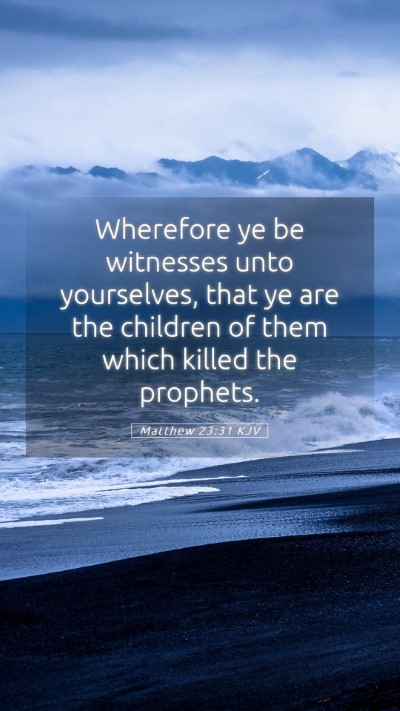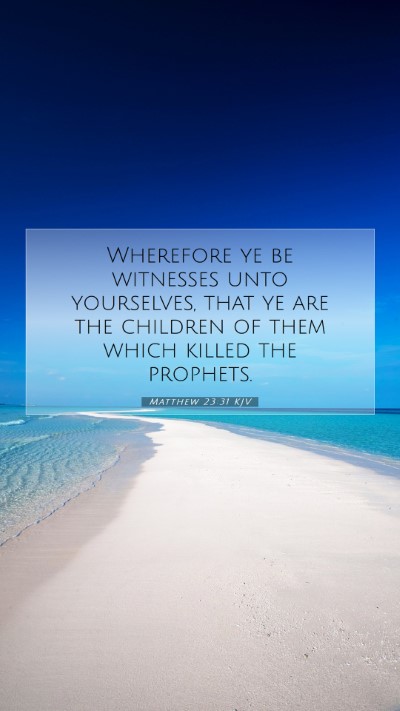Understanding Matthew 23:31: A Comprehensive Bible Verse Commentary
Matthew 23:31 states: "Wherefore ye be witnesses unto yourselves, that ye are the children of them which killed the prophets." This verse stands as a straightforward yet profound declaration within the context of Jesus' condemnation of the religious leaders of His time.
Verse Context and Significance
This verse is part of a larger discourse where Jesus addresses the Pharisees and scribes, accusing them of being hypocritical and complicit in the deeds of their ancestors who persecuted the prophets. Jesus here highlights the continuity of guilt from the past to the present among these leaders.
Key Insights from Commentaries
- Matthew Henry: Henry emphasizes the concept of witnesses, pointing out that the scribes and Pharisees are showcasing their own guilt by acknowledging their alignment with the actions of their forebears. They inherit not just a legacy of knowledge but also a legacy of rejection towards prophets.
- Albert Barnes: Barnes notes that this verse captures the essence of self-incrimination. By claiming to be children of those who killed the prophets, the leaders reveal their inner disposition and lack of reverence for God's messengers, demonstrating a continued rebellion against God's truth.
- Adam Clarke: Clarke elaborates on the historical implications of the verse, providing insights into how the acts of past generations influence present behaviors. His commentary points toward the inevitability of judgment that comes upon such conduct, reinforcing the idea that they are contributing to their own downfall.
Biblical Exegesis and Theological Implications
The verse serves as a poignant critique of religious hypocrisy. It underscores a theological principle that rejecting God's messengers leads to spiritual death and distortion. When individuals or groups consistently choose to follow in the footsteps of their ancestors' sins, they risk facing severe judgments.
Application to Daily Life
Understanding Matthew 23:31 encourages reflection on our own lives—how do we respond to God's messengers today? Are we attuned to the voices of good teaching and wisdom, or do we resist and rationalize away the truth?
Bible Study Insights
When studying this passage, consider the following insights:
- This verse invites readers to assess the theological continuity of sin and the consequences of familial or cultural inheritance in matters of faith.
- It challenges individuals to be aware of their own attitudes towards truth and leadership.
- It promotes the idea of accountability in spiritual lineage—what legacy are we choosing to emulate?
Related Bible Cross References
- Luke 11:47-51 - An echoing condemnation of those who build tombs for the prophets.
- Matthew 23:29-30 - Discusses similar accusations regarding the hypocrisy of the religious leaders.
- John 16:2 - Jesus mentions that the time will come when people will kill His followers, believing they are doing God service.
Conclusion: The Significance of Matthew 23:31
This verse not only reflects the historical tensions of first-century Judaism but also speaks into the heart of contemporary faith. It calls readers to a deeper understanding of the consequences of rejecting God's truth and the importance of recognizing our spiritual legacy.
In conclusion, Matthew 23:31 is significant for anyone engaged in Bible study groups, online Bible study, or seeking Bible study insights into how to interpret and apply scripture in their daily lives. It challenges us to examine our hearts and the potential for hypocrisy within our own spiritual journeys.


